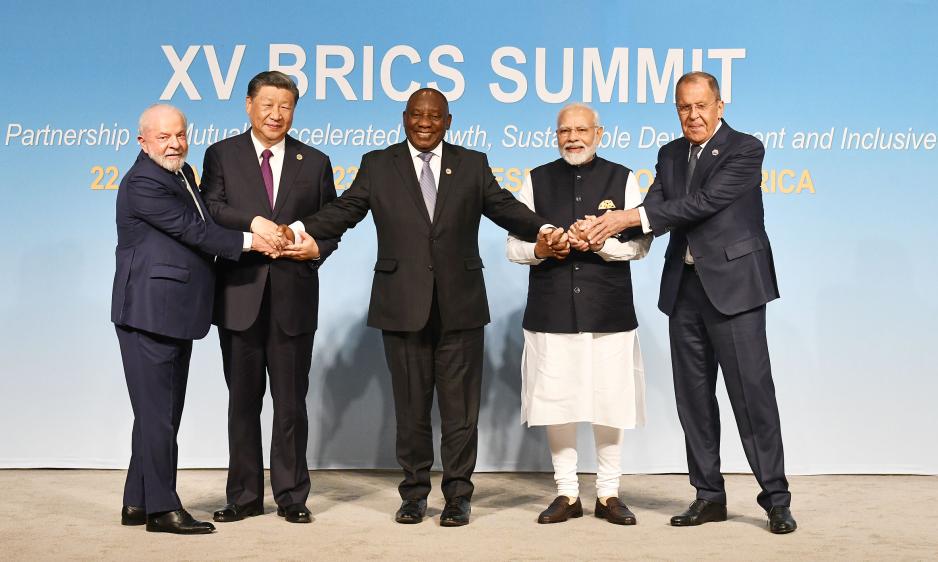Op-ed: BRICS by BRICS: Brazil’s Accession to the Svalbard Treaty and the Politics of Partnership

Russia, represented here by Foreign Minister Sergei Lavrov, is reaching out to the BRICS countries for cooperation in a number of spheres and parts of the world – not least in the Arctic. Here, Lavrov is at the BRICS summit in South Africa last Wednesday with the leaders of the cooperation format: (from left) Brazilian President Lula da Silva, Chinese President Xi Jinping, South African President Cyril Ramaphosa and Indian Prime Minister Narendra Modi. (Photo: GCIS)
The Brazilian government has submitted the proposal to sign the Svalbard Treaty to the National Congress, which is now under consideration.
The opinions expressed here belongs to the author and do not represent the views of High North News.
According to Jefferson Cardia Simões, Director of the Polar and Climate Center at the Federal University of Rio Grande do Sul (UFRGS), whom I spoke with during the Arctic Circle Assembly 2025 in Rejkjavik (16-18 October), “there is no reason for the agreement not to pass, there is no cost to it”.
If approved, Brazil will become the last BRICS country to join the Svalbard Treaty, extending the bloc’s legal footprint all the way to the High North. Brazil’s entering Svalbard inevitably raises the question of alignment or, as Arne Holm put it, “another BRICS in the wall.”
Research is not explicitly mentioned among the activities covered by the Svalbard Treaty; however, Norwegian authorities have in practice facilitated international research and education on the archipelago, creating the conditions for today’s diverse scientific community.
Yet political trust in the post-Ukraine invasion era has fractured, and Brazil is stepping into that gap.
In the post-2022 Arctic, the question is not who you are but who you are with. Threat perception has shifted, and the term “like-minded states” is emphasized more than ever.
Brazil positions itself as a gatekeeper of its own partnerships
Professor Simões explained that Brazil has been in communication with Russia regarding a possible joint scientific station on Svalbard: “We are open to cooperation, but what matters if someone offers it”.
Rather than seeking entry into a Western-defined framework, Brazil positions itself as a gatekeeper of its own partnerships.
Cooperation becomes performative; a way of signaling diplomatic autonomy and claiming legitimacy in an international order where moral hierarchies have blurred and the lines between good and bad partners are no longer fixed.
This actually fits President Lula da Silva’s broader foreign-policy posture that a deliberate balancing act that favors pragmatic autonomy over ideological alignment.
For Brazil, joining the Svalbard Treaty is more than a legal act, it is an entry point into Arctic dialogue. Svalbard offers one of the rare platforms through which non-Arctic or geographically distant states can engage directly with Arctic under a legitimate international framework.
Also read (The text continues)
In that sense, the archipelago functions as a diplomatic crossroads between presence and participation.
BRICS, But Not BRICS-as-Usual
The BRICS are not present in Svalbard as BRICS. They do not act as a coordinated bloc, nor do they pursue a shared Arctic strategy.
Rather, they perform separate actions; China as an established polar power, India as a cautious multilateralist, Brazil as a newcomer seeking legitimacy through cooperation.
This dispersion exemplifies what could be called post-Western multilateralism that the Western states are no longer alone in setting the rules of multilateral cooperation and new actors are also co-constructing the narratives(s) of the Arctic.
Two years ago, Russia floated the idea of establishing a science center in Pyramiden with its BRICS partners.
China already operates the Yellow River Station in Ny-Ålesund
Yet, little has materialized from that proposal. Indian representatives made it clear that India has had no talks with Russia on scientific cooperation in Svalbard as they are already conducting research there.
China, for its part, already operates the Yellow River Station in Ny-Ålesund. Brazil, by contrast, as a BRICS member, is currently discussing such cooperation with Russia.
Its motivation is both practical and symbolic; to begin conducting Arctic research and, through that, to enter the Arctic arena.
From a normative (increasingly a suspicious term, though) perspective, perhaps naively, cooperation can mean something quite different for actors outside the established circles.
Rather than treating every gesture as a move in a geopolitical game, one might read cooperation as an act of survival, an effort to persist in a world that seldom makes room for difference.
Also read (the text continues)
For some, cooperation is not a geopolitical maneuver, but a way to remain visible and to exercise the rights that international law already grants them.
Cooperation as a Choice to Know the Other
Since Russia’s invasion of Ukraine, EU’s and USA’s relations with Moscow have reached their lowest point since the end of the Cold War, shaping how every act of alignment is interpreted.
Even if the system is called “multipolar”, in today’s fractured world, the zeitgeist pushes states toward bipolarity; one is either with so-called West or with Russia-China axis. Global debate has increasingly revolved around the hype word like-mindedness.
But perhaps it is time to look at cooperation from a diagonal angle; how can non-Arctic and non-Arctic-Council observers develop integration in the region?
Such a perspective could help Arctic states recalibrate their own strategies, but also Arctic venues and gatherings need to open space for those developing their Arctic interests.
Brazil or Turkey cooperating through Russia in Svalbard
The question is not only how those non-Arctics engage with Arctic ones but how they might cooperate among themselves within the Arctic and what such cooperation could evolve into.
Considering, for instance, the possibility of Brazil or Turkey cooperating through Russia in Svalbard rather than in the established research hub of Ny-Ålesund; a shift that would carry clear political symbolism as well as scientific value.
This might make Oslo’s job more difficult in the archipelago and strengthen alternative alignments. This is where science diplomacy becomes pivotal.
Today, scientific cooperation is not peripheral, it is constitutive of Arctic politics and of how legitimacy is performed. Science diplomacy remains one of the most debated instruments for reshaping relations with Russia, yet it has also become a source of disruption in Svalbard politics.
Under the Treaty, Norway cannot refuse new signatories and drafted in 1920, the Treaty could not have anticipated how central science would become to Arctic governance.
About BRICS
The BRICS is a group formed by 11 countries: Brasil, Russia, India, China, South Africa, Saudi Arabia, Egypt, United Arab Emirates, Ethiopia, Indonesia, and Iran.
It serves as a political and diplomatic coordination forum for countries from the Global South and for coordination in the most diverse areas.
To prevent science diplomacy from being demonized by association, it may be more useful to rethink alignment, to practice selective, situational cooperation rather than exclusion. Cooperation is a choice.
It is a choice to know the other, to keep the unfamiliar close rather than remain surrounded by the same, by the self.
That is why greater inclusivity matters. To preserve the spirit of what was once called “exceptional” Arctic governance needs to become less geo-epistemologically Euro-centric and less focused on formal observer status within the Arctic Council or membership in the Svalbard Treaty.
The challenge, and opportunity, lies in engaging states that are not yet part of Arctic institutions but have developing research agendas, so that their participation comes through dialogue, not surprise.
In the end, what matters is not how many Arctic strategies are written in Berlin or London, but how many new voices are allowed to enter the room. The stability of the Arctic will depend not only on those who have long spoken for the region, but also on those who seek to speak with it.



